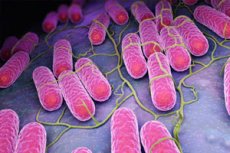New publications
Salmonella study reveals potential use of bacteria to treat colon cancer
Last reviewed: 02.07.2025

All iLive content is medically reviewed or fact checked to ensure as much factual accuracy as possible.
We have strict sourcing guidelines and only link to reputable media sites, academic research institutions and, whenever possible, medically peer reviewed studies. Note that the numbers in parentheses ([1], [2], etc.) are clickable links to these studies.
If you feel that any of our content is inaccurate, out-of-date, or otherwise questionable, please select it and press Ctrl + Enter.

Scientists from the Universities of Glasgow and Birmingham have made a major discovery that could bring the use of Salmonella bacteria closer to treating bowel cancer. The study, published in the journal EMBO Molecular Medicine, examined the response of T cells to a specially modified, safe form of Salmonella in mice with colorectal cancer.
Key findings of the study
The problem of suppressing the immune system
Salmonella was previously known to suppress tumor growth, but its use was limited by the fact that the bacteria also suppress the immune system, particularly T cells, which play a key role in fighting infections and cancer.Mechanism of suppression
The researchers found that the bacteria reduced levels of the amino acid asparagine, which suppresses tumor growth but is also necessary for T-cell activation.Solution to the problem
The team proposed genetically modifying Salmonella so that it does not reduce asparagine levels, which would allow T cells to effectively fight tumor cells.
The potential of a new approach
Alternative treatments:
Bowel cancer is the second biggest cause of cancer death in the UK, claiming around 16,800 lives each year. New treatments are desperately needed, particularly in Scotland, where around 4,000 cases are diagnosed each year.Modifying bacteria:
Using genetically modified bacteria will not only suppress the tumor, but also activate immune cells to fight cancer.
Researchers' opinion
Dr Kendle Maslowski (University of Glasgow):
- "We know that weakened forms of Salmonella can fight cancer, but until now it was unknown why they were not as effective. Our study showed that this is due to the bacteria attacking asparagine, which is needed to activate T cells. We believe that it may be possible to modify the bacteria so that they do not reduce asparagine levels, which could open up new and effective ways to treat cancer."
Dr Alastair Copland (University of Birmingham):
- "Bacterial therapies are an exciting way to treat cancer by starving tumors of essential nutrients. Our discovery provides insight into how to leverage this approach to turn pathogenic bacteria into cancer-fighting agents."
Advantages and Prospects
Bacteria-based immunotherapy:
This approach could become part of modern immunotherapies that use the body's defense mechanisms to fight diseases.Safety of use:
Genetic modification makes bacteria safe, which opens up new horizons for their use in medicine.Future Research:
The next stage of the work is to further develop methods for using bacteria to treat colorectal and other cancers, which could offer hope to many patients.
Conclusion
Cancer Research UK's director of research, Dr Catherine Elliott, said:
"The power of bacteria has long been recognised in scientific circles, but their use in cancer has remained on the fringes. This discovery could lead to the development of more effective treatments for bowel cancer patients and other cancers in the future."
Research continues to unlock the full potential of Salmonella bacteria in fighting cancer.
